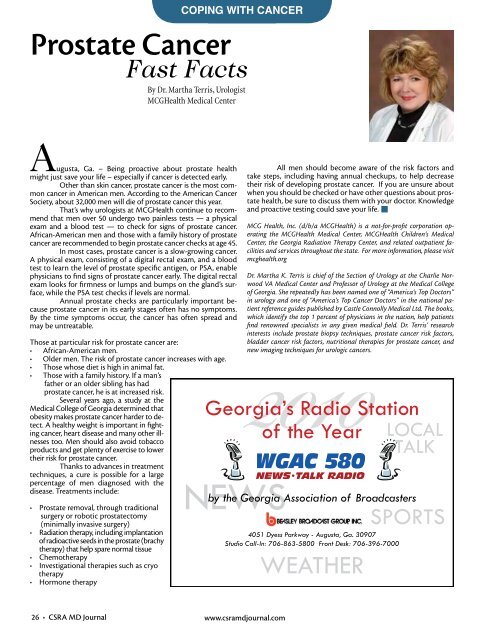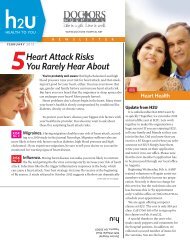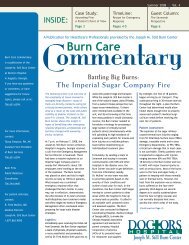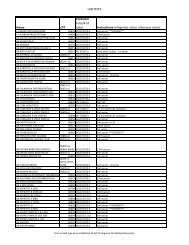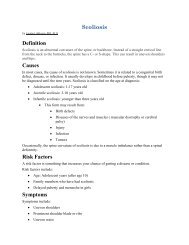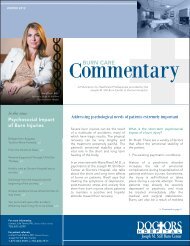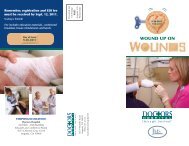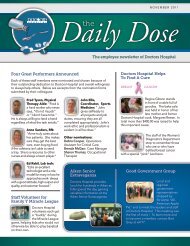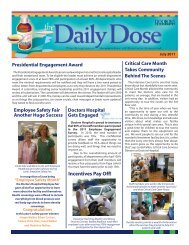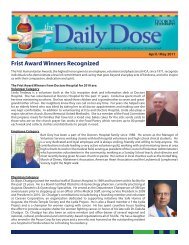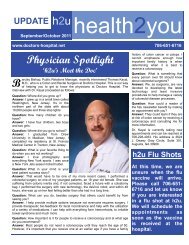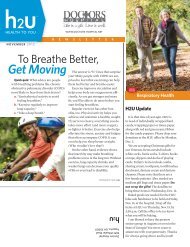CSRA MD Journal - Doctors Hospital
CSRA MD Journal - Doctors Hospital
CSRA MD Journal - Doctors Hospital
You also want an ePaper? Increase the reach of your titles
YUMPU automatically turns print PDFs into web optimized ePapers that Google loves.
Prostate CancerCOPING WITH CANCERFast FactsBy Dr. Martha Terris, UrologistMCGHealth Medical CenterAugusta, Ga. – Being proactive about prostate healthmight just save your life – especially if cancer is detected early.Other than skin cancer, prostate cancer is the most commoncancer in American men. According to the American CancerSociety, about 32,000 men will die of prostate cancer this year.That’s why urologists at MCGHealth continue to recommendthat men over 50 undergo two painless tests — a physicalexam and a blood test — to check for signs of prostate cancer.African-American men and those with a family history of prostatecancer are recommended to begin prostate cancer checks at age 45.In most cases, prostate cancer is a slow-growing cancer.A physical exam, consisting of a digital rectal exam, and a bloodtest to learn the level of prostate specific antigen, or PSA, enablephysicians to find signs of prostate cancer early. The digital rectalexam looks for firmness or lumps and bumps on the gland’s surface,while the PSA test checks if levels are normal.Annual prostate checks are particularly important becauseprostate cancer in its early stages often has no symptoms.By the time symptoms occur, the cancer has often spread andmay be untreatable.Those at particular risk for prostate cancer are:• African-American men.• Older men. The risk of prostate cancer increases with age.• Those whose diet is high in animal fat.• Those with a family history. If a man’sfather or an older sibling has hadprostate cancer, he is at increased risk.Several years ago, a study at theMedical College of Georgia determined thatobesity makes prostate cancer harder to detect.A healthy weight is important in fightingcancer, heart disease and many other illnessestoo. Men should also avoid tobaccoproducts and get plenty of exercise to lowertheir risk for prostate cancer.Thanks to advances in treatmenttechniques, a cure is possible for a largepercentage of men diagnosed with thedisease. Treatments include:All men should become aware of the risk factors andtake steps, including having annual checkups, to help decreasetheir risk of developing prostate cancer. If you are unsure aboutwhen you should be checked or have other questions about prostatehealth, be sure to discuss them with your doctor. Knowledgeand proactive testing could save your life.MCG Health, Inc. (d/b/a MCGHealth) is a not-for-profit corporation operatingthe MCGHealth Medical Center, MCGHealth Children’s MedicalCenter, the Georgia Radiation Therapy Center, and related outpatient facilitiesand services throughout the state. For more information, please visitmcghealth.orgDr. Martha K. Terris is chief of the Section of Urology at the Charlie NorwoodVA Medical Center and Professor of Urology at the Medical Collegeof Georgia. She repeatedly has been named one of “America’s Top <strong>Doctors</strong>”in urology and one of “America’s Top Cancer <strong>Doctors</strong>” in the national patientreference guides published by Castle Connolly Medical Ltd. The books,which identify the top 1 percent of physicians in the nation, help patientsfind renowned specialists in any given medical field. Dr. Terris’ researchinterests include prostate biopsy techniques, prostate cancer risk factors,bladder cancer risk factors, nutritional therapies for prostate cancer, andnew imaging techniques for urologic cancers.• Prostate removal, through traditionalsurgery or robotic prostatectomy(minimally invasive surgery)• Radiation therapy, including implantationof radioactive seeds in the prostate (brachytherapy) that help spare normal tissue• Chemotherapy• Investigational therapies such as cryotherapy• Hormone therapy26 • <strong>CSRA</strong> <strong>MD</strong> <strong>Journal</strong>www.csramdjournal.com


